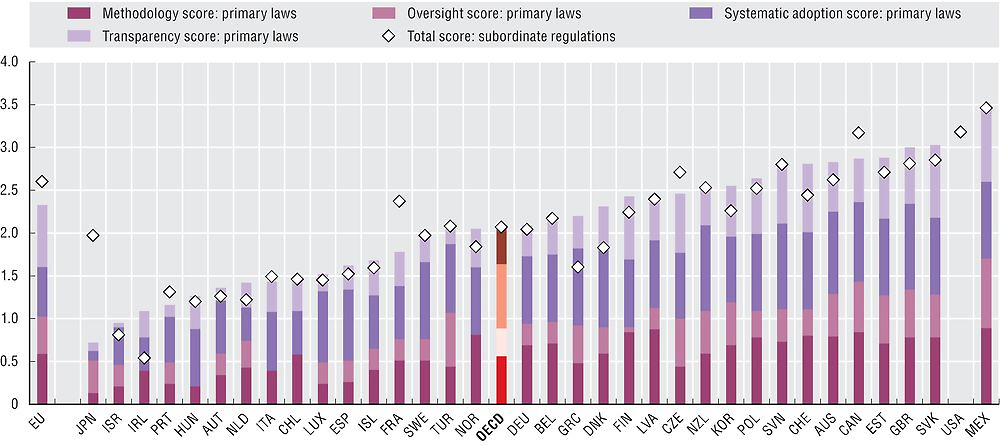Stakeholder engagement for developing regulations
Stakeholder engagement is a crucial element of regulatory policy. It helps to ensure that regulations are in the public interest by involving those that are affected by regulations, including citizens, businesses, civil society and other community members. Stakeholder engagement improves the quality of rule making by collecting ideas, expertise and evidence from stakeholders about policy problems to be solved and possible solutions to address them. It also ensures that regulation is user-centred and responds to the needs of those governed. By consulting all affected parties, stakeholder engagement enhances the inclusiveness of policies and supports the development of a sense of ownership of regulations. This in turn strengthens trust in government, social cohesion and compliance with regulations.
The OECD Indicators of Regulatory Policy and Governance (iREG) provide the first comprehensive evidence base of progress made by OECD countries in improving the way they regulate based on the practices described in the 2012 OECD Recommendation of the Council on Regulatory Policy and Governance. The more of these practices a country has adopted, the higher its indicator score. The composite indicator is composed of four equally weighted categories: methodology gathers information on methods and tools for stakeholder engagement; oversight and quality control records information on mechanisms to monitor and evaluate stakeholder engagement practices;systematic adoption records formal requirements, and how often they are conducted in practice; and transparency records information relating to the principles of open government. The maximum score for each category is 1, and the total score for the composite indicator ranges from 0 to 4. While Government at a Glance 2015 presented some of the underlying data for iREG, this edition includes three composite indicators constructed on the basis of survey data. The iREG composite indicator on stakeholder engagement presented here is also one of the central indicators used to measure the dimension “civic engagement” of the OECD Better Life Index.
Most OECD countries have adopted stakeholder engagement practices and developed a methodology for conducting stakeholder engagement. OECD countries use different forms of stakeholder engagement, ranging from public online consultation to formal consultation with social partners as well as informal consultation mechanisms. The highest scores are received by countries such as Canada, Estonia, Mexico, the Slovak republic, the United Kingdom and the United States that have invested in a transparent stakeholder engagement framework and oversight and quality control mechanisms. For example, countries with high scores make stakeholder engagement processes open to any member of the public and publish stakeholder comments as well as the government’s responses to them. They have assigned some institutional responsibility for oversight of stakeholder engagement and publish information on the functioning of their stakeholder engagement system (such as the Mexican Federal Commission for Regulatory Improvement (COFEMER)). Countries that do not systematically conduct public consultations, that consult stakeholders only at a late stage in the regulatory development process or that do not have minimum periods for submitting comments tend to score low, including Ireland, Israel, Japan and Portugal. Indicator scores for stakeholder engagement in developing subordinate regulations are slightly lower than for developing primary laws in most OECD countries, which is due to the fact that processes are less strict for subordinate regulations.
The Indicators of Regulatory Policy and Governance (iREG) draw upon responses provided by delegates to the OECD Regulatory Policy Committee and central government officials to the OECD Regulatory Indicators Survey for all OECD countries and the European Commission in 2014, and for Latvia in 2016. The data only cover primary laws and subordinate regulations initiated by the executive. In the majority of OECD countries, most primary laws are initiated by the executive, except for Mexico and Korea, where a higher share of primary laws are initiated by the legislature (respectively 90.6% and 84%). All questions on primary laws are not applicable to the United States as the executive does not initiate primary laws at all. More information on the iREG indicators can be found in an Annex online and at : www.oecd.org/gov/regulatory-policy/indicators-regulatory-policy-and-governance.htm.
Primary laws are regulations that must be approved by the legislature, while subordinate regulations can be approved by the head of government, by an individual minister or by the cabinet.
Further reading
OECD (forthcoming), Best Practice Principles on Stakeholder Engagement in Regulatory Policy, OECD Publishing, Paris.
OECD (2015), OECD Regulatory Policy Outlook 2015, OECD Publishing, Paris.
OECD (2012), 2012 OECD Recommendation of the Council on Regulatory Policy and Governance, OECD Publishing, Paris.
Figure notes
8.1: Country scores are presented in order of total scores for primary laws, with the exception of the United States, for which the score for subordinate regulations is taken as a basis.
Information on data for Israel: https://doi.org/10.1787/888932315602.

Source: OECD (2015), Indicators of Regulatory Policy and Governance (iREG), OECD Publishing, Paris, http://www.oecd.org/gov/regulatory-policy/indicators-regulatory-policy-and-governance.htm.
